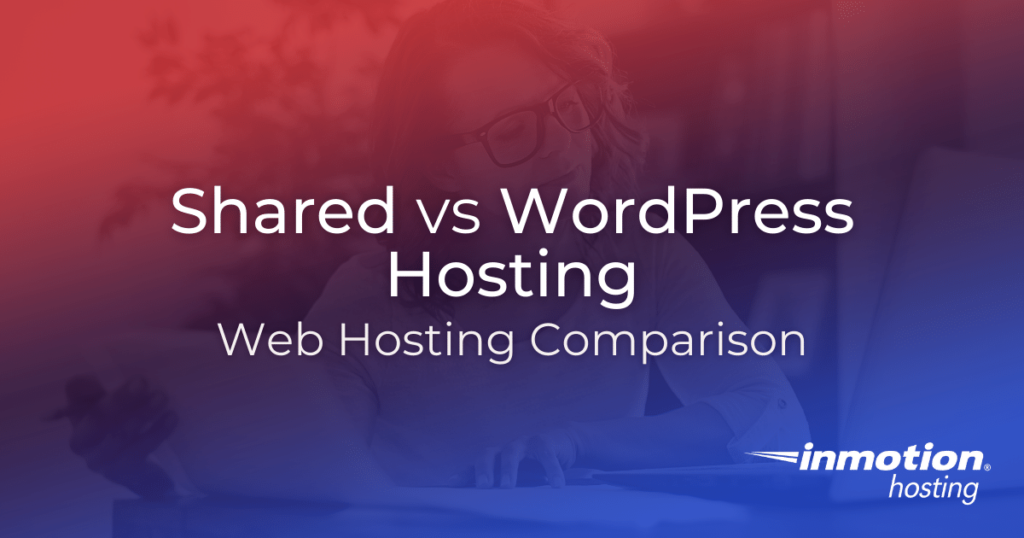
Not sure where to start when it comes to choosing between Shared Hosting vs WordPress Hosting? If you’ve decided to purchase a web hosting plan for your business, you may be wondering about the difference between two of the most popular plan types — Shared Hosting and WordPress Hosting.
There is a great deal in common between the two. Both products provide powerful resources that can host incredible websites, provide excellent performance, and make for unforgettable user experiences. Standard Shared Hosting plans are still great places to host a WordPress site!
The main difference between the two is optimization and specialization. Let’s take a look at the similarities and differences to help you find what’s right for your business.
Plan Overviews
Shared Hosting
Shared Hosting is one of the simplest, most cost effective options available to someone who wants their website online. It’s often preferred for smaller personal websites like a blog, portfolio, or other medium traffic site. With this hosting option, your website is placed on a computer server along with many other websites.
You share the resources of the server with other users. This resource sharing can sometimes lead to issues, but the upside is that you have a lot more space for a considerably lower cost than other forms of hosting.
There is such a thing as a shared VPS account. This is different from shared hosting. In a VPS account, you are sharing space on a larger server, however you have dedicated resources for your account that will not be affected by other users. Learn more about VPS hosting.
WordPress Hosting
WordPress Hosting, however, is built from the ground up specifically for the WordPress content management system (CMS). WordPress is the most commonly used CMS today and it is known for being fast, secure, and reliable. WordPress Hosting is a form of Shared Hosting specifically managed to support WordPress sites.
When we mention that a plan or server is “managed”, we mean that the server’s updates and technical aspects are handled by trained professionals. This lets you focus more on your site’s content and actually running your website.
Making a Choice
Do You Want WordPress?
The primary limitation of a WordPress Hosting plan is that you can’t pivot to a different CMS. Chances are, if you’re not sure what you need, WordPress is still a great starting choice. After all, WordPress is incredibly popular for a reason. You can build any type of website using WordPress and you’ll have an easy time finding everything from ready-made software in the form of plugins to highly skilled designers at comparatively low prices.
How Much for How Much?
WordPress plans usually have fewer resources or a slightly higher costs compared to Shared Hosting plans of the same level. On a pure ‘dollars per month’ basis, though, this difference is inconsequential for most businesses until you get into the double digits. Besides, unless you’re building a photography gallery or an eCommerce store with thousands of items, WordPress sites rarely start out larger than a few gigabytes.
On the other hand, if all you want as many resources as you can get for the lowest possible cost, a standard Shared Hosting plan is the way to go.
Special Features of WordPress Plans
NGINX – The Key Difference: The biggest advantage of a WordPress specific plan is that your website will run as fast as possible thanks to advanced server caching. While you can run WordPress sites on a standard Shared Hosting plan, plans optimized for WordPress are a step up in performance and stability.
Since the server only hosts WordPress websites, the overall speed and resource load has been optimized with advanced caching to bring super fast load times. At InMotion, all of our WordPress Hosting Plans are on NGINX servers, letting us make the most of its advanced caching features to speed up response time.
Advanced Caching: In a traditional hosting environment, WordPress dynamically generates all the content that makes up your web page for every single guest that lands on that page. Completely generating all the text, graphics, and features in this fashion slows site loading experiences. It can also easily exhaust the resources of your hosting service.
With NGINX caching, WordPress only has to generate a web page once for the first visitor. Later visitors will then see a saved copy of that web page until you edit it again. That means significantly improved load times for your website, as well as the capacity to serve a greater number of visitors.
PHP-FPM – The Latest and Greatest: Additionally, a FastCGI manager called PHP-FPM spawns processes to manage your online applications. Typically, your web server would have to use plugins to display and process your PHP code. PHP-FPM runs its own server so it can process PHP code natively. This separation of features has shown some incredible speed and performance gains for PHP applications like WordPress.
Shared Hosting vs WordPress Hosting: Final Thoughts
Choosing the right website hosting plan can be a difficult choice. However, if you do your research and are honest about your site and your plans, you are sure to find a plan that fits your needs. If you still want to know more about what each of these plans can offer, check out the product pages for Shared Hosting and WordPress Hosting so you can compare.
If you want to learn more about the technology behind the advanced caching we discussed above, check out our resources on NGINX in the Support Center.
If you need a new home for your WordPress site, look no further than InMotion’s WordPress Hosting solutions for secure, optimized, budget-friendly servers.
Fast & Easy Transfers
Free SSLs
Hack Protection
Affordable